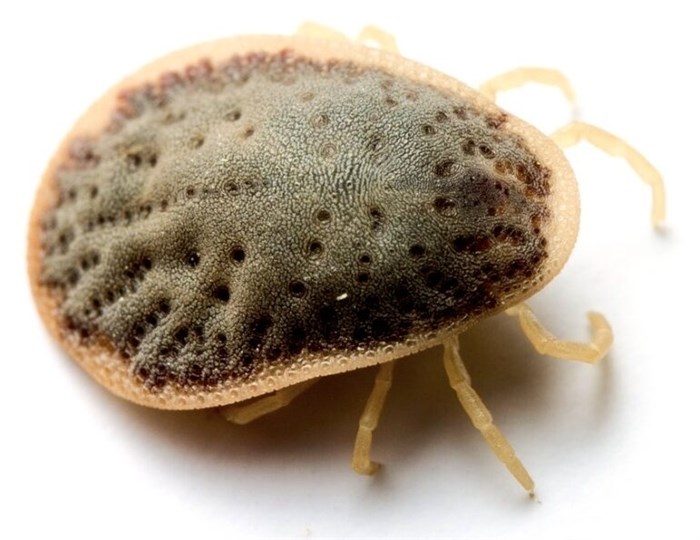
Kelowna resident Jason Ackerman is pictured in Kelowna in this undated photograph.
Image Credit: SUBMITTED/ Jason Ackerman
July 03, 2025 - 6:00 AM
Kelowna resident Jason Ackerman is nearing the end of a long, confusing medical battle after he was bitten by an infected tick while camping over a year ago.
The otherwise healthy, active outdoorsman has tick-borne relapsing fever, which causes crippling side effects that landed him in the emergency room on several occasions since early 2024.
“It has been hard to figure it out, I wasn’t sure what was going on," he said.
The disease is caused by borrelia hermsii, a bacteria spread by soft-shelled ornithodoros hermsi ticks in BC, and there are only between zero and seven cases of it every year, according to the BC Centre for Disease Control website.
The feeding behaviours of the ticks make them a difficult source to pinpoint.
“I didn’t notice a spot on me, but the (specialists) said the bite looks like a crusted up bit of blood,” he said. “It isn’t like Lyme disease where you see a ring around the bite.”
This type of tick lives in rodent burrows where it feeds on rodents, however, humans can become infected when sleeping in cabins that have infected rodents in them.
Soft-bodied ticks have a brief feed and leave instead of burrowing under the skin like hard-bodied ticks do. People can be unaware of the bite until symptoms appear anywhere between three and 12 days later.
“I’ve never stayed in a cabin, I’m a tent camper, I think it got me in a tent,” Ackerman said. “We went camping a few times and didn’t notice anything, but then I started getting sickly every few weeks.”

FILE PHOTO
Image Credit: SUBMITTED/ TickSafety
Every four to six weeks, Ackerman was getting cold and flu-like symptoms, aches and pains and extreme fatigue, but initially passed it off after testing positive for COVID-19.
An infected person will have periods of fever for one to three days alternating with no fever for four days to two weeks for one to more than ten cycles. Other symptoms are headache, muscle and joint pain, shaking chills, and abdominal pain.
In more severe cases, there could be bleeding problems, confusion, inflammation around the heart and respiratory failure.
When his symptoms didn’t go away, Ackerman went to see his doctor.
“He suspected I had reactive arthritis because my hands were starting to swell and hurt, and my family had a history of auto immune disease,” he said.
Ackerman was referred to a rheumatologist but had to wait on a list for a year to see one. In the meantime, he was hospitalized several times.
“I was swelling up and couldn’t walk anymore, my leg was seizing up,” he said. “I was told I had an auto immune disease and kept taking prescribed steroids which would take the symptoms away but was making the infection worse.”
READ MORE: iN NUMBERS: Species invading the Okanagan and Kamloops
Eventually, Ackerman was referred to an internal medicine specialist at Kelowna General Hospital who later referred him to the infectious disease clinic after ruling out other causes for the symptoms.
“We were going down a bunch of avenues to see what was going on, I was sweating and tired and my lymph nodes were swelling,” he said. “This disease presents similarly to rheumatoid arthritis, lupus or lymphoma.”
Ackerman saw a specialist at the clinic roughly six weeks ago where numerous lab tests were conducted and a formal diagnosis for the bacteria borellia hermsii was confirmed. He was put on a couple of courses of different antibiotics before finding one that worked and he'll be taking his final dose soon.
“I haven’t had symptoms other than mild fatigue for the first time in 250 days,” he said. “It’s five dollars of medication and it probably cost the system a million dollars trying to trouble shoot this.”
READ MORE: Dismissed, denied and misdiagnosed: A Kamloops woman's Lyme disease journey
Awareness and avoidance is best prevention for tick-borne disease, according to the BC Centre for Disease Control.
“I suspect this will be something people will run into more considering the increase in tick activity and rodent populations in the past few years,” he said. “I just hope people will not pass off symptoms and can get to a diagnosis faster than I did.
“This is brutal, I’m going through the processing phase of how much this disrupted my life for over a year.”
Ackerman said his terrible experience isn’t going to stop him from enjoying the great outdoors but now he uses tick repellent.
He extended gratitude to KGH Labs, Radiology and the ER, Infectious Diseases department at KGH, Internal Medicine at KGH and his family doctor.
To contact a reporter for this story, email Shannon Ainslie or call 250-819-6089 or email the editor. You can also submit photos, videos or news tips to the newsroom and be entered to win a monthly prize draw.
We welcome your comments and opinions on our stories but play nice. We won't censor or delete comments unless they contain off-topic statements or links, unnecessary vulgarity, false facts, spam or obviously fake profiles. If you have any concerns about what you see in comments, email the editor in the link above. SUBSCRIBE to our awesome newsletter here.
News from © iNFOnews, 2025